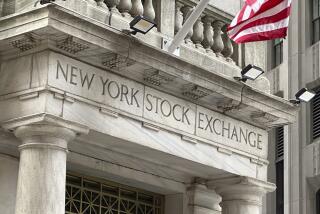Dow Jones Shakes Up Its Index With Four Replacements
- Share via
NEW YORK — The landlord of Wall Street’s best-known symbol is evicting four longtime tenants.
In a historic shake-up to diversify the 30-stock Dow Jones industrial average, Westinghouse Electric Corp., Texaco Inc., Bethlehem Steel Corp. and Woolworth Corp. are out, Dow Jones & Co. announced Wednesday.
They will be replaced on Monday by Travelers Group, Hewlett-Packard Co., Johnson & Johnson and Wal-Mart Stores Inc.
The last changes to the Dow industrials were made in May 1991, when Caterpillar Inc., Walt Disney Co. and J.P. Morgan were substituted for Navistar International Corp., USX Corp. and Primerica Corp.
The latest shuffle leaves the measure--born 100 years ago when economic power was measured by heavy industry’s might--without a steelmaker, but with a greater focus on the booming industries of technology, health care and financial services.
“We’ve always thought of ‘industrials’ as meaning more than manufacturing,” said Paul E. Steiger, managing editor of the Wall Street Journal, which chooses the companies and is published by Dow Jones.
“Nowadays, technological innovation and services of all types are major propellants of the U.S. economy,” Steiger said in a statement.
The companies being removed either lag others in their industry or have shifted from the focus that put them among the ranks of America’s most prominent companies.
Westinghouse, which built an industrial powerhouse with electrical generating plants and kitchen appliances, bought the CBS network last year. It is being removed because of plans announced in November to split into two companies, one handling its refrigerated truck and nuclear power operations and the other its media holdings.
Broadcasting already is represented in the Dow by General Electric Co., which owns NBC, and Disney, which owns ABC.
Its replacement, Travelers, has powerful insurance and brokerage holdings, including Smith Barney. It will join J.P. Morgan as the only other financial company in the industrial average and would be the only insurer.
Travelers is, in effect, returning to the Dow. After Primerica was removed six years ago, it bought Travelers and took its name.
Texaco is being removed from a roster that already includes bigger oil companies Exxon Corp. and Chevron Corp. Bethlehem Steel is the nation’s second-largest steelmaker, but has been losing money and jettisoning unprofitable businesses.
Hewlett-Packard, the nation’s No. 2 computer company, joins IBM Corp. in the technology ranks of the Dow. Johnson & Johnson, the maker of Tylenol and Band-Aids, joins Merck & Co. as the health-care components.
Wal-Mart is the world’s largest retailer and No. 4 in the Fortune 500, eclipsing $100 billion in annual sales last year for the first time. Woolworth has been struggling, selling or closing more than 700 stores, including four chains.
As usual when it makes changes in the index, Dow Jones said it will slightly adjust the formula used to calculate the average, to preserve its historical continuity.
The Dow has been soaring to unprecedented heights, rising 75% over the past two years to eclipse the 7,000-point barrier. Its rapid growth has prompted worries --and cautionary statements from Federal Reserve Chairman Alan Greenspan--about whether the market is expanding too fast and investors are headed for a fall.
The changes come amid criticism that the Dow has been deficient in representing today’s dominant technology and consumer services sectors. There are also complaints that the Dow, with only 30 companies, cannot possibly be as representative of the economy as a broader index such as the Standard & Poor’s 500-stock index.
The Dow marked its 100th anniversary last year. Its roots go back to July 3, 1884, Dow Jones co-founder Charles H. Dow created an average of 11 stocks, nine of which were railroad companies.
The official Dow Jones average originally was made up of 12 stocks and moved to 30 by 1928.
Three of the four stocks being removed on Monday have been the Dow’s worst performers since the last change was made on May 6, 1991. However, Steiger insisted that Dow Jones doesn’t kick stocks out of the index simply for lagging.
Even so, by substituting companies in faster-growing industries for those in more cyclical business, Dow Jones raises the likelihood that the index will rise significantly in the years ahead.
(BEGIN TEXT OF INFOBOX / INFOGRAPHIC)
New Names for Old Index
Here are the substitutions Dow Jones & Co. will make in the 30-stock Dow Jones industrial average, which has changed stocks relatively infrequently in its 100-year history:
*--*
OUT IN Bethlehem Steel Johnson & Johnson (steel) (health care) Westinghouse Travelers Group (media) (financial services) Texaco Hewlett-Packard (energy) (technology) Woolworth Wal-Mart (retailing) (retailing)
*--*
Source: Dow Jones & Co.
Dow Leaders Since Last Change
Here are the 30 stocks in the Dow Jones industrial average and their price changes since May 6, 1991--the last time Dow Jones reshuffled the index. Changes reflect any stock splits or corporate spinoffs along the way.
*--*
Stock Change Union Carbide +533% Allied Signal +401% Goodyear Tire +373% Coca-Cola +342% Sears +294% United Technologies +241% Caterpillar +224% Procter & Gamble +202% American Express +199% General Electric +188% Eastman Kodak +178% McDonald’s +167% DuPont +161% Walt Disney +147% Merck +138% Boeing +128% 3M Co. +116% Alcoa +111% Philip Morris +101% J.P. Morgan +99% Exxon +72% Chevron +70% General Motors +54% Texaco +54% AT&T; +44% IBM +40% Intl. Paper +37% Woolworth -27% Westinghouse -32% Bethlehem Steel -40% Dow industrials +139%
*--*
Source: Bloomberg News
More to Read
Inside the business of entertainment
The Wide Shot brings you news, analysis and insights on everything from streaming wars to production — and what it all means for the future.
You may occasionally receive promotional content from the Los Angeles Times.










